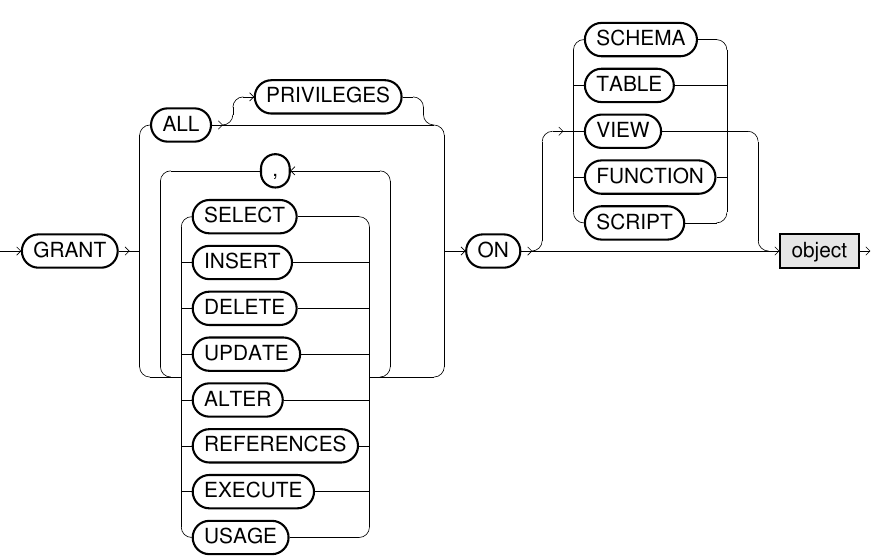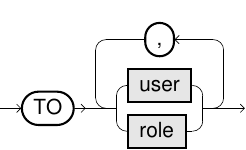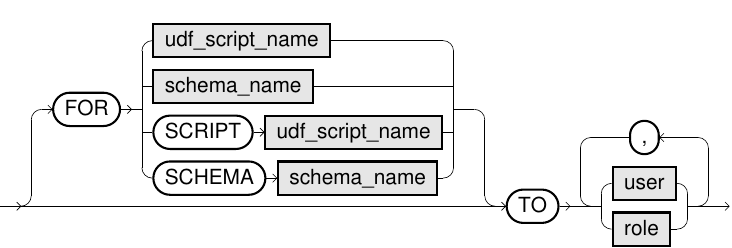Purpose
Use the GRANT statement to grant system privileges, object privileges, roles, or connection access
to users or roles. For detailed information about system and object privileges and rights management, see Details on Rights Management under the Privileges section.
Prerequisites
| SQL Statement | Required Privileges |
|---|---|
GRANT <sys_priv> TO u
|
System privilege |
GRANT <ob_priv> ON o TO u
|
|
GRANT r TO u
|
System privilege |
GRANT IMPERSONATION ON u TO r
|
The current user must have the DBA role. |
GRANT CONNECTION c TO u
|
System privilege GRANT ANY CONNECTION or c was granted to the current user or one of that user's roles with the WITH ADMIN OPTION. |
GRANT ACCESS ON CONNECTION c TO u
|
System privilege GRANT ANY CONNECTION or c was granted to the current user or one of that user's roles with the WITH ADMIN OPTION. |
Syntax
grant_system_privileges::=


grant_object_privileges::=


grant_roles::=

grant_impersonation::=

grant_Connection::=


grant_connection_restricted::=


Usage Notes
- To ensure the security of the database, you should use the
GRANTin a very targeted manner. Some of the privileges and roles lead to full control of the database. The DBA role possesses all possible system privileges with theADMINoption. With the privilegeGRANT ANY PRIVILEGE, it is possible to grant all system privileges. With theALTER USERprivilege, it is possible to change the password ofSYS. And with theGRANT ANY ROLEprivilege it is possible to grant all roles (for example, you could grant the role of DBA). - With
GRANT ALL, the user is granted all system or object privileges. - When granting an object privilege on a schema, this privilege is applied to all contained schema objects.
- Object privileges cannot be granted on individual objects in a virtual schema, only on the schema itself.
- The object privilege
REFERENCEScannot be granted to a role. - Assigned roles cannot be activated or deactivated by the user.
- For information on impersonation, refer to the description of IMPERSONATE statement.
- The
ACCESSprivilege grants access to the details of a connection (also the password) for UDF scripts. TheACCESSprivilege is necessary for adapter scripts of virtual schemas. -
To see a schema in Exasol version 7.0 and later, a user must have the
USAGEobject privilege on the schema or theUSE ANY SCHEMAsystem privilege. Even if the user has other object privileges (such asSELECT) on the schema or on objects within it, they will not be able to access the objects unless they also have been granted usage rights.USE ANY SCHEMAis by default granted to thePUBLICrole. To enhance database security, we recommend revokingUSE ANY SCHEMAfrom thePUBLICrole and granting it only to specific roles and users as needed. IfUSE ANY SCHEMAhas been revoked from thePUBLICrole, you need to useGRANT USAGEin combination withGRANT SELECTwhen granting schema privileges. - For information on the consumer groups and connections, refer to Resource Manager section and the descriptions of the statement CREATE CONNECTION.
-
For information about privileges and rights management, refer to Details on Rights Management under the Privileges section.
-
For information about system and object privileges, see the lists below.
List of System and Object Privileges
The following tables describe the system privileges in Exasol.
Miscellaneous
| System Privilege | Permissions |
|---|---|
GRANT ANY OBJECT PRIVILEGE
|
Grant or withdraw any object rights |
GRANT ANY PRIVILEGE
|
Grant or withdraw any system rights (this is a powerful privilege and should only be granted to a small number of users) |
SET ANY CONSUMER GROUP
|
Set consumer group for users or roles |
MANAGE CONSUMER GROUPS
|
Create, alter and drop consumer groups |
CREATE SESSION
|
Connect to database |
KILL ANY SESSION
|
Kill session or query |
ALTER SYSTEM
|
Alter system-wide settings (for example, |
IMPORT
|
Import data into tables using the |
EXPORT
|
Export data from tables using the |
Users
| System Privilege | Permissions |
|---|---|
CREATE USER
|
Create user |
ALTER USER
|
Alter the password of any user (this is a powerful privilege and should only be granted to a small number of users) |
DROP USER
|
Delete user |
IMPERSONATE ANY USER
|
Impersonate other users |
Roles
| System Privilege | Permissions |
|---|---|
CREATE ROLE
|
Create roles |
DROP ANY ROLE
|
Delete roles |
GRANT ANY ROLE
|
Grant any role (this is a powerful privilege and should only be granted to a small number of users) |
Connections
| System Privilege | Permissions |
|---|---|
CREATE CONNECTION
|
Create external connections |
ALTER ANY CONNECTION
|
Change connection data of a connection |
DROP ANY CONNECTION
|
Delete connections |
GRANT ANY CONNECTION
|
Grant any connection to users/roles |
USE ANY CONNECTION
|
Using any connection in statements |
ACCESS ANY CONNECTION
|
Access any connection details from scripts |
Schema
| System Privilege | Permissions |
|---|---|
CREATE SCHEMA
|
Create a schema |
ALTER ANY SCHEMA
|
Allocate a schema to another user or role |
DROP ANY SCHEMA
|
Delete any schema |
CREATE VIRTUAL SCHEMA
|
Create of a virtual schema |
ALTER ANY VIRTUAL SCHEMA
|
Update parameters of any virtual schema |
ALTER ANY VIRTUAL SCHEMA REFRESH
|
Update the metadata of any virtual schema |
DROP ANY VIRTUAL SCHEMA
|
Delete any virtual schema |
USE ANY SCHEMA
|
See and use any schema. This privilege is granted to PUBLIC by default when a new database is setup. |
Tables
| System Privilege | Permissions |
|---|---|
CREATE TABLE
|
Create table in one's own schema or that of an allocated role ( |
CREATE ANY TABLE
|
Create a table in any schema |
ALTER ANY TABLE
|
Alter a table in any schema |
DELETE ANY TABLE
|
Delete rows in a table in any schema |
DROP ANY TABLE
|
Delete a table in any schema |
INSERT ANY TABLE
|
Insert data into a table from any schema |
SELECT ANY TABLE
|
Access the contents of a table or view from any schema (does not include system tables) |
SELECT ANY DICTIONARY
|
Access the contents of any system table |
UPDATE ANY TABLE
|
Alter rows in a table from any schema |
Views
| System Privilege | Permissions |
|---|---|
CREATE VIEW
|
Create views in one's own schema or in that of an allocated role (DROP is implicit as the owner of a view can always delete these) |
CREATE ANY VIEW
|
Create a view in any schema |
DROP ANY VIEW
|
Delete a view in any schema |
Functions
| System Privilege | Permissions |
|---|---|
CREATE FUNCTION
|
Create functions in one's own schema or in those of an allocated role ( |
CREATE ANY FUNCTION
|
Create functions in any schema |
DROP ANY FUNCTION
|
Delete functions from any schema |
EXECUTE ANY FUNCTION
|
Execute functions from any schema |
Scripts
| System Privilege | Permissions |
|---|---|
CREATE SCRIPT
|
Create scripts in one's own schema or in those of an allocated role ( |
CREATE ANY SCRIPT
|
Create scripts in any schema |
DROP ANY SCRIPT
|
Delete scripts from any schema |
EXECUTE ANY SCRIPT
|
Execute scripts from any schema |
The following table describes the object privileges in Exasol.
| Object Privilege | Schema Objects | Permissions |
|---|---|---|
ALTER
|
Schema, table, virtual schema |
Run the |
SELECT
|
Schema, table, view, virtual schema, virtual table |
Access to the table contents |
INSERT
|
Schema, table |
Insert rows in a table |
UPDATE
|
Schema, table |
Change the contents of a row in a table |
DELETE
|
Schema, table |
Deletion of rows |
REFERENCES
|
Table |
Creation of foreign keys referencing this table |
EXECUTE
|
Schema, function, script |
Run functions or scripts |
IMPERSONATION
|
User |
Impersonating another user identity |
ACCESS
|
Connection |
Access details of a connection from scripts |
REFRESH
|
Virtual schema |
Update the metadata of a virtual schema |
USAGE
|
Schema | View and use a schema |
Examples
-- System privilege
GRANT CREATE SCHEMA TO role1;
GRANT USE ANY SCHEMA TO user1;
GRANT SELECT ANY TABLE TO user1 WITH ADMIN OPTION;-- Object privileges
GRANT USAGE ON my_schema TO user1, role2;
GRANT INSERT ON my_schema.my_table TO user1, role2;
GRANT SELECT ON VIEW my_schema.my_view TO user1;-- Access on my_view for all users
GRANT USAGE ON my_schema TO PUBLIC;
GRANT SELECT ON my_schema.my_view TO PUBLIC;
-- Roles
GRANT role1 TO user1, user2 WITH ADMIN OPTION;
GRANT role2 TO role1;-- Impersonation
GRANT IMPERSONATION ON user2 TO user1;-- Connection
GRANT CONNECTION my_connection TO user1;-- Access to connection details for certain script
GRANT ACCESS ON CONNECTION my_connection
FOR SCRIPT script1 TO user1;